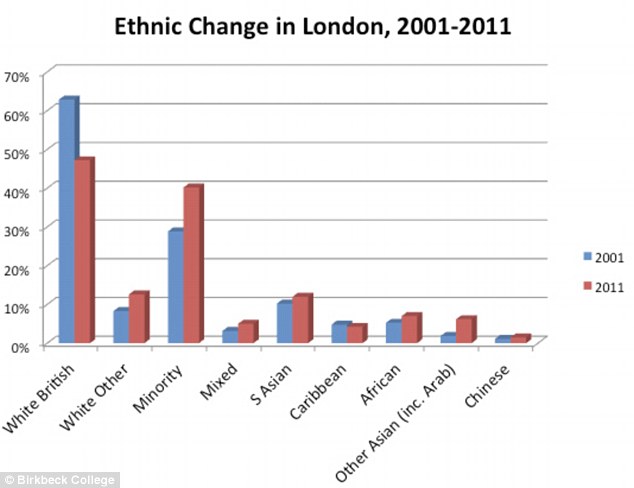Rise of ‘White Flight’: British Families Are ‘Self-Segregating’ as More Caucasians Abandon Urban Areas for the Countryside
Emma Reynolds, Daily Mail (London), January 27, 2013
Britain is ‘self-segregating’ as white families flee urban areas for the countryside and outer suburbs.
The trend is causing an ‘ethnic cliff’, in which the proportion of households from minority backgrounds is vastly different in areas just a few miles apart.
Some outer London boroughs – including Enfield, Waltham Forest and Redbridge – have seen their white British population drop by as much as a quarter over the past decade.
The same applies to urban areas around the capital such as Luton, Reading and Bedfordshire.
Meanwhile, the white British population in many suburban and rural districts just next door has soared, according to research produced by Birkbeck College, University of London, in conjunction with think tank Demos.
‘Between 2001 and 2011, the proportion of white British in London’s population fell from 58 to 45 per cent,’ said Birkbeck professor of politics Eric Kaufmann.
‘The share of ethnic minorities reached 40 per cent of the total, a 39 per cent increase.’
‘This has caught many by surprise… Analysts implied that London would not become “majority minority” in most of our lifetimes, but the latest census figures suggest otherwise.’
Affluent white families from diverse wards in London are shifting to less diverse wards in the outer suburbs.
In the extreme example of Barking and Dagenham, the research shows, a third of the white British population departed between 2001 and 2011. Since many lack the resources to move or are council tenants, this suggests that a majority of local white British who could leave may have done so.
The phenomenon has gone largely unnoticed until now because British city centres tend to have a fairly broad racial mix visible on the streets, in shops and restaurants and in many workplaces.
Prof Kaufmann added: ‘While white avoidance of ethnic minorities is the first thought that comes to mind, it’s important to consider the alternative explanations. Most diverse wards are urban and poor.
‘Whites may be leaving for better schools, cheaper homes, fresher air, or because they are more likely to be retirees, wealthier or better educated. Only a statistical approach which controls for these factors can tell us whether ethnic preferences are key.’
The share of minorities in London has increased by a percentage point a year since 1991.
Minorities are moving out of their areas of concentration to better neighbourhoods, resulting in ever larger heavily-minority zones.
Prof Kaufmann likened the situation to that in the US – where white Americans leave or avoid ‘majority minority’ neighbourhoods and seek out areas that are over 70 per cent white.
He added: ‘Whether Britain will follow in America’s footsteps is an open question: much will depend on the residential preferences of working-class British whites and whether they are able to realise them.’
















